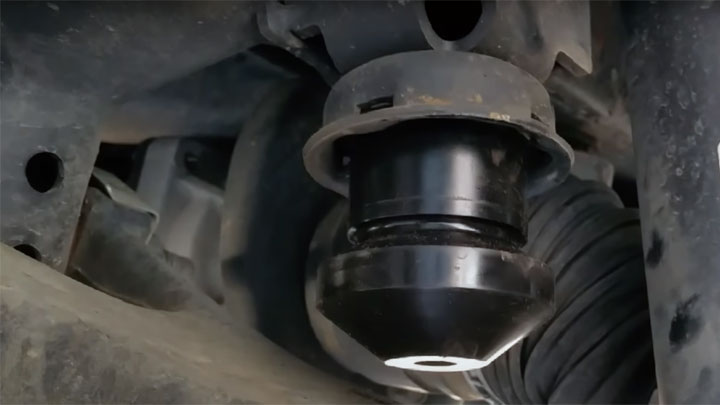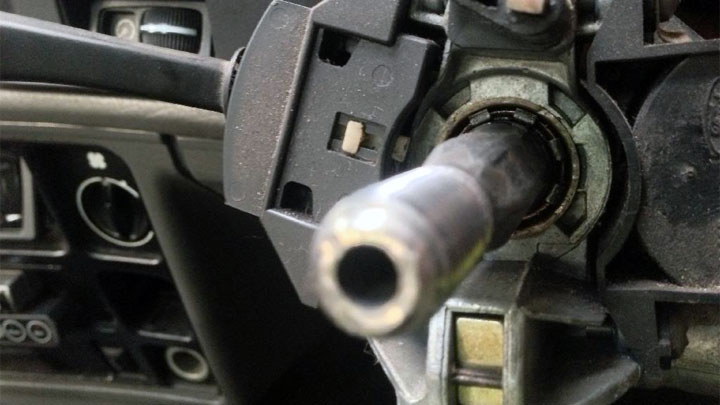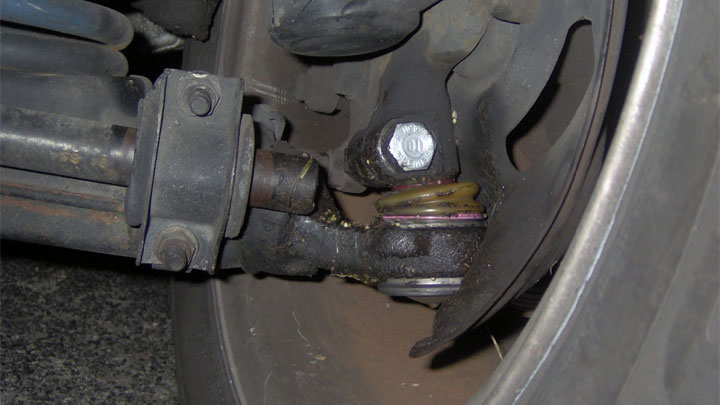If you’ve noticed that your steering wheel is making noise when you turn it, you’re probably wondering what could be causing the issue. There are several potential causes of a noisy steering wheel, and it’s important to identify and address the root cause in order to fix the problem.
In this blog post, we’ll explore 9 common causes of a steering wheel that makes noise when turning. By understanding the potential causes, you’ll be better equipped to diagnose and fix the issue with your vehicle.
Top 9 Causes of Steering Wheel Noise When Turning
When the steering and suspension components begin to fail, it can be difficult for the vehicle to bear its weight and maneuver in the expected ways. Signs of trouble may include creaks or groans when turning the wheel. To help extend their lifespan, these parts should be lubricated regularly; however, they will wear down eventually. Here are the most common causes of steering wheel noise when turning:
1. Jounce Bushing is Dry

The front strut of your vehicle has a jounce bushing located on its top. This rubber part helps to cushion the vertical movement and impact of the suspension system when driving over bumps and other road irregularities.
Over time, however, this bushing can become dry and worn out as it gets older, leading to a creaking or groaning noise when you make turns. If left unchecked, this issue will only worsen and cause further damage to other components of the suspension.
It is important to replace these bushings regularly to ensure that your vehicle’s suspension remains in good condition. Proper maintenance can help extend the lifespan of your strut and keep it running smoothly for years to come.
2. Bad Power Steering Rack

A “whining” sound while turning the steering wheel may be an indicator of a bad power steering rack. This sound will likely be more prominent when driving at lower speeds. It could also indicate that there is an issue with the belt or vane pump, which are both parts of the power steering system.
In any case, if you are noticing an abnormal noise while turning the wheel, it is best to have a professional mechanic check it out as soon as possible. Doing so will help ensure that your vehicle remains safe and reliable on the road.
3. Bad Struts and Shocks

If your shocks and struts are in poor condition, they won’t be able to provide the necessary support for your vehicle’s suspension system when you turn. As a result, turning the wheel can cause loud noises that sound like knocking or clunking. It is important to have these components inspected regularly in order to identify any potential issues before it causes any damage to other parts of the vehicle.
4. Worn Steering Column Bearing

If you hear a loud rubbing noise when you turn your steering wheel, the upper bearing on the steering column could be to blame. This issue is especially noticeable in hot weather as heat causes certain parts to expand, causing the plastic on the back of some steering wheels to rub against the cowling on the steering column.
If this noisy rubbing persists, it is important to get it checked out as soon as possible to avoid any further damage or safety risks.
A qualified mechanic should be able to examine the steering column and identify the source of the noise. Taking care of this issue promptly will ensure your car remains safe and reliable for years to come.
5. Bad Tie Rod Ends

The tie rod ends are the parts that connect the steering wheel to the wheels of your vehicle. Over time, they can become worn out due to everyday wear and tear, resulting in a knocking noise when turning the wheel. If left unchecked, this issue will only worsen and cause further damage to other components of the suspension. It is important to have a qualified mechanic check the tie rod ends regularly in order to prevent any major issues from occurring.
6. Bad Ball Joints

The steering knuckles and control arms are crucial components in your vehicle’s suspension system. They enable the wheels to move up and down, providing a comfortable ride for occupants. In order for these components to operate properly, they must be kept lubricated with oil or grease. If the ball joints become dry, it can cause noise when turning and can even cause the steering wheel to shake.
Worn ball joints are a common culprit when this occurs, and they must be checked regularly to ensure they stay lubricated and in good condition. If you notice any strange noises or steering issues, a qualified mechanic should inspect your vehicle’s ball joints as soon as possible. Catching worn or dry ball joints early can help you avoid any larger repairs down the road.
7. Bad Control Arm Bushings

As time goes on, the control arm bushings will start to deteriorate due to regular wear and tear. This can lead to the cracking of the rubber material which encases them, resulting in a loud creaking sound when you turn the steering wheel. The cracks can also cause a loose feel in the vehicle’s suspension system, as well as increased friction and noise when driving over bumps or potholes.
Eventually, the control arm bushings must be replaced to ensure a smooth ride. If left unchecked, the wear and tear can cause serious damage to the vehicle’s suspension system that may require expensive repairs. So it is important to keep an eye on them and replace them as soon as you notice any signs of wear and tear. This will help ensure the safety of your vehicle and avoid costly repairs in the future.
8. Power Steering Fluid Leaks

The power steering system uses a special type of fluid to provide lubrication and transmit the needed pressure that allows for smooth steering movements. This fluid is contained in a reservoir, from which it flows into the steering rack and pinion or steering box. If there is any leakage of this power steering fluid, it can lead to audible noise, especially while turning.
The level of fluid in the reservoir is likely to drop, thus indicating a possible leak. Therefore, it is important to check for any leaks and ensure that there is enough power steering fluid for the proper functioning of the system.
It is also important to note that certain types of fluids are designed specifically for use with power steering systems hence it is important to read through your vehicle’s manual to ensure that you are using the right type of fluid. Failing to do this can cause damage to other components in the system leading to further expensive repairs or replacements down the line.
Therefore, it is important to check for any power steering fluid leaks and top up if necessary, in order to ensure the smooth and safe operation of your vehicle.
9. Clogged Power Steering Fluid Reservoir

Power steering fluid is a vital component of the power steering system, stored in the steering reservoir tank. This reservoir typically contains a filter, designed to keep the fluid clean and free of debris. When this filter becomes clogged, it can cause issues such as a loud noise when turning the wheel or difficulty with handling. In order to ensure the proper functionality of the power steering system, it is important to keep the reservoir tank and filter clean.
Additionally, if the fluid in the reservoir tank becomes dirty or low, it should be replaced for optimal performance. Regular maintenance and inspection of the power steering system can prevent issues from arising and ensure that your vehicle operates safely and efficiently.
How much will it cost to have this issue fixed?
It is difficult to estimate the cost of repairing a noisy steering wheel without knowing the specific cause of the noise. The cost of the repair will depend on the extent of the damage and the parts and labor required to fix it.
For example, if the noise is caused by loose steering wheel mounting bolts, the cost of the repair may be minimal, as you will only need to tighten the bolts. On the other hand, if the noise is caused by worn steering column bearings or a faulty steering rack or power steering pump, the repair may be more expensive, as these components may need to be replaced.
In general, it is a good idea to get a diagnostic inspection from a mechanic to determine the cause of the noise and get an estimate for the repair. This will give you a better idea of the potential cost of the repair. It is also a good idea to shop around and get quotes from multiple mechanics to find the best price.
Conclusion
In conclusion, a steering wheel that makes noise when turning can be caused by a variety of issues, including loose steering wheel mounting bolts, worn steering column bearings, and faulty steering components such as the steering rack or power steering pump. It is important to diagnose and fix the cause of the noise, as ignoring the issue can lead to further damage and potentially unsafe driving conditions.
The cost of repairing a noisy steering wheel will depend on the specific cause of the noise and the parts and labor required to fix it. If you are experiencing a noisy steering wheel, it is a good idea to get a diagnostic inspection and estimates from a mechanic to determine the cause of the noise and the potential cost of the repair. I hope this information will be useful to you in keeping your car running safely and efficiently.
FAQs
It is generally not safe to drive with a steering wheel that makes noise when turning, as it can indicate a problem with the steering system. If the steering system is not functioning properly, it can be difficult to control the vehicle and may increase the risk of an accident.
The specific method for fixing a steering wheel that makes noise when turning will depend on the cause of the issue. In some cases, it may be possible to fix the problem by tightening or replacing components. In other cases, it may be necessary to replace the entire steering system. It is important to have the problem diagnosed by a mechanic to determine the cause and the appropriate repair method.
Yes, you can clean the power steering filter yourself. You will need to remove the filter from the reservoir tank and use a rag or brush to carefully wipe away any dirt or debris. It is important to make sure that the filter is completely clean before reinstalling it in order to ensure optimal performance.
When you experience noise while turning your steering wheel, difficulty turning the wheel, play or looseness in the steering wheel or steering column, vibrations or wobbling when turning, and/or unevenly worn tires, these can all be signs of a problem with your steering system. If you have noticed any of these symptoms, it is important to get your steering wheel checked by a qualified mechanic. Doing so can help to identify any issues and prevent further damage.
The cost of repairing a noisy steering wheel will depend on the specific cause of the noise and the parts and labor required to fix it. In some cases, such as if the noise is caused by loose mounting bolts, the cost may be minimal. On the other hand, if the issue requires replacing a part of the steering system, such as the steering rack or power steering pump, the repair can be more costly. It is important to get an estimate from a mechanic before proceeding with any repairs.
It is possible that a steering wheel may need to be replaced if it is making noise when turning. However, other components in the steering system may also be the cause of the noise. To determine if the steering wheel itself needs to be replaced, it is necessary to have the problem diagnosed by a mechanic.
If your steering wheel is making noise when turning, it is a good idea to have it checked by a mechanic as soon as possible. Ignoring the problem could lead to further damage to the steering system or other components of the vehicle.
It is not necessarily normal for a steering wheel to make noise when first starting to drive after sitting for a while. If this is occurring, it may be a sign of a problem with the steering system or other components of the vehicle.
A creaking noise when turning the steering wheel can be caused by a number of factors, including worn or damaged steering components, loose or worn steering column components, or a worn or damaged steering wheel cover or pad. It is important to have the problem diagnosed by a mechanic in order to determine the cause and identify the appropriate repair.
If your steering wheel is making a grinding noise when turning, it is likely an indication of a serious issue with the steering system or another part of the vehicle. It is important to have the issue diagnosed and repaired by a qualified mechanic as soon as possible in order to avoid further damage or even a breakdown.
A crunching noise when turning the steering wheel can be a sign of a problem with the steering system, such as worn or damaged steering components or debris in the system. It can also be caused by a problem with the suspension system, such as worn or damaged suspension components.
A popping noise when turning the steering wheel can be caused by a variety of issues, such as worn or damaged steering components, loose or worn steering column components, or a worn power steering pump. It is important to have the issue diagnosed and repaired by a qualified mechanic in order to prevent further damage.
A clicking noise when turning the steering wheel can be caused by a number of factors, including worn or damaged steering components, loose or worn steering column components, or a worn or damaged steering wheel cover or pad. It can also be caused by a problem with the suspension system, such as worn or damaged suspension components.
Rattling noise when turning the steering wheel can be caused by a number of factors, including loose or worn steering column components, worn or damaged steering wheel bearings, or debris in the steering system.
Driving with a steering wheel that makes noise when turning can have several consequences. It can make it difficult to control the vehicle, which can increase the risk of an accident. It can also lead to further damage to the steering system or other components of the vehicle, which can be costly to repair. Therefore, it is important to have any issues with the steering wheel checked and repaired by a qualified mechanic as soon as possible.
It is generally not recommended to drive with a steering wheel that makes noise when turning, even if you do not hear the noise all the time. The problem could be intermittent, but it is still important to have it checked by a mechanic to ensure the steering system is functioning properly. Continuing to drive with a problem in the steering system can lead to further damage or increase the risk of an accident. It is always a good idea to have any vehicle issues addressed as soon as possible to ensure the safety of the vehicle and its occupants.
